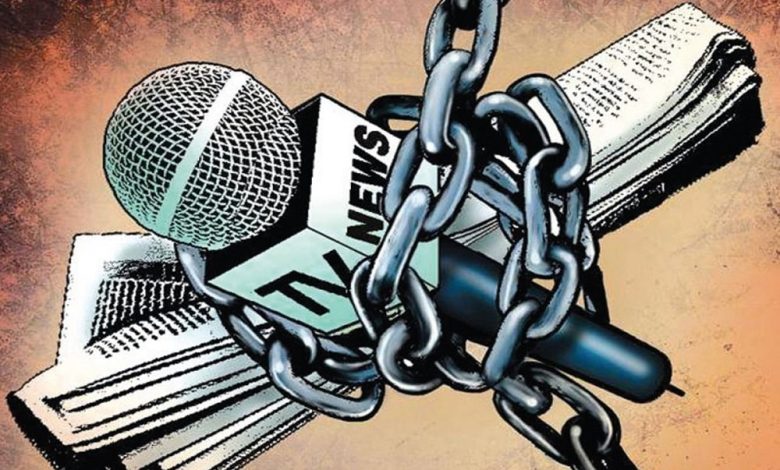Honoring Those Killed or Jailed for Touching the Untouchable Clerical Sanctity

Written by
Sedighe Shahrokhi
Reports from Iran indicate that a state-affiliated journalist was apprehended for allegedly insulting the Friday prayer leader of Karaj, west of Tehran.
Amid the regime’s aggravating infighting, Mohammad-Mehdi Hosseini Hamedani criticized a member of Karaj’s city council because her daughter had spent time in the upscale parts of Tehran. Mahyar Taghikhani, a state-affiliated journalist, asked whether Hamedani would act if her daughter did the same.
This was enough for Hamedani’s office to press defamation charges against Taghikhani, ultimately resulting in his imprisonment. The regime’s judiciary condemned the journalist based on the so-called “Blasphemy law in Iran.”
When there’s nothing to loot anymore, thieves lock horns, and this is precisely why Hamedani criticized an official in Karaj’s city council, and Taghikhani published an article about Hosseini.
Taghikhani’s arrest caused a lot of stir in the regime, forcing Hamedani to deny he had pressed any charges against the journalist. But he defended Taghikhani’s arrest. “The judiciary performed its duties well, and it should rigorously continue implementing the law based on the related information,” he said on May 20, as quoted by the state-run Aftabnews.
Arresting journalists in Iran, even those linked to the regime, is not new. According to the Reporters Without Borders’ latest report, under the mullahs’ regime, Iran ranks 178 out of 180 countries in terms of press freedom.
“At least 1,000 journalists and citizen-journalists have been arrested, detained, murdered, disappeared, or executed by the Iranian regime since 1979,” the report adds.
The Iranian regime apprehends anyone taking a step toward the truth or unveiling the mullahs’ crimes and kleptocracy.
The Iranian regime’s medieval constitution considers its ominous rule divine and celestial, and its criminal officials as sacred people.
As such, anything and anyone undermining Iran’s ruling theocracy would be condemned as “deviating from Islam” and punishable.
Thousands have been purged under the pretext of “blasphemy” and “spreading corruption on earth.” Many more are enduring harsh prison sentences and experience a variety of tortures.
The Iranian Resistance recently revealed damning documents of Iran’s Prison Organization, including the number of people imprisoned on political charges.
According to this list, prisoners, incarcerated for their political and ideological beliefs, are sentenced to harsh sentences for insulting the regime’s top officials, such as Supreme Leader Ali Khamenei.
In the regime’s judiciary terminology, regime officials are considered “sacred” and “Islamic sanctities” mean the symbols of the mullahs. Many prisoners endure lengthy prison terms for “insulting” Khamenei and other regime officials.
The systematic incarceration and mistreatment of dissidents, or anyone daring to tell the truth, leaves no room for authentic and unbiased “journalism.” Those who try to honor their journalistic mandate are doomed. Zahra Kazemi, an Iranian Canadian journalist, was arrested in 2003 and died under torture after attempting to take pictures from a gathering of families of Evin prisoners.
Two environment reporters, Reyhaneh Yasini and Mashhad Karimi lost their lives in a car crash en route to northwest Iran. It was later revealed that the bus carrying two journalists had been sabotaged as they were researching an environmental issue related to the Revolutionary Guards (IRGC) projects in northwest Iran.
The current so-called “journalists” in Iran are “willingly” working under the regime and are part of Tehran’s “ministry of truth.” They have been whitewashing the mullahs’ crimes. That they are now acknowledging a part of the country’s realities, is due to the mounting social pressures.
Iran’s state TV hosts, such as Ameneh Sadad-Zabih-pour and Ali Rezvani, are infamous for extracting false confessions from dissidents on air. In February 2013, the United States Treasury Department imposed sanctions on the “Islamic Republic of Iran Broadcasting (IRIB), the state broadcasting umbrella group, as a human rights abuser.” These sanctions were imposed since the IRIB is “implicated in censoring multiple media outlets and airing forced confessions from political detainees.”
Besides, Tehran selectively allows journalists to travel to Iran and do research. No wonder these so-called “journalists” coming from Iran Sugarcoat the horrific living conditions in Iran in their reports.
Journalism, as a noble profession, supposes to report the truth and achieve checks and balances to leverage the power of public opinion against the power of the rule. As this profession has practically died out inside Iran, relying on “official sources” is nothing but submitting to a propaganda apparatus that spreads lies as a profession. If the free world is seriously interested in learning the truth about Iran, even for the sake of honoring those precious lives lost for shedding light in the darkest corners of the world, it ought to start by boycotting the official sources and start learning about the alternatives.

